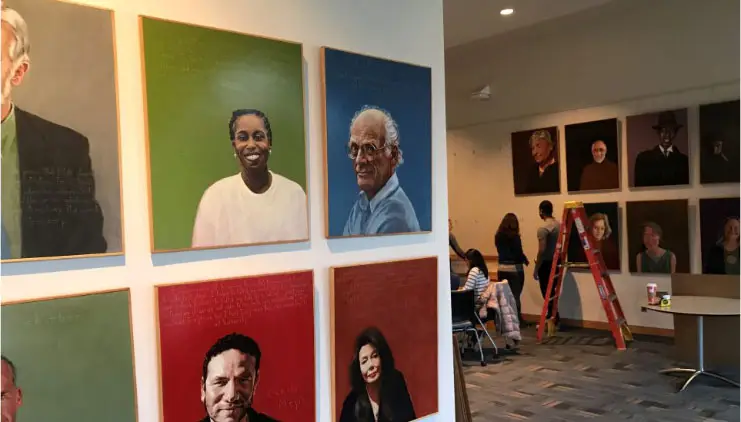
Bill McKibben
Bill McKibben
Author, Christian, Environmentalist : b. 1960
“America is simultaneously the most professedly Christian of the developed nations and the least Christian in its behavior. At the moment the idea of Jesus has been hijacked by people with a series of causes that do not reflect his teachings. It’s hard to imagine a con much more audacious than making Christ the front man for a program of tax cuts for the rich or war in Iraq. . . . We have made golden calves of ourselves – become a nation of terrified, self-obsessed idols.”
Speaking Truth to Youth
Climate activist Bill McKibben reminds youth that social solidarity is key in fighting climate change and that there is a strong connection between patriotism and dissent.
Biography
Bill McKibben is a writer and avid environmentalist. Currently serving as the Schumann Distinguished Scholar in Environmental Studies at Middlebury College in Vermont, he has written several books, and contributes regularly to publications such as The New York Times, The Atlantic Monthly, Orion, and Mother Jones. He is on the board of Grist Magazine, for which he also writes articles.
McKibben’s books vary in nature; however, it was his first book that established him as an environmental writer. The End of Nature, published in 1989 and translated into twenty-four languages, addressed the issue of climate change. Originally serialized in The New Yorker, it was considered the first alarm about climate change aimed at a general audience. With tragedies like Hurricane Katrina and record setting heat waves bringing global warming into sharper focus, his writings have grown even more important.
An active participant in the Methodist Church, McKibben sees religion as playing a vital role in protecting the future of Earth. A document called the Evangelical Climate Initiative led McKibben to write an article asserting that “given that 85 percent of Americans identify themselves as Christians, and that we manage to emit 25 percent of the world’s carbon dioxide – well, the future of Christian environmentalism may have something significant to do with the future of the planet.”
Today, he examines the economy, the environment, and the overall happiness of the U.S. McKibben writes that formerly it was accepted that growing the economy would make people wealthier, and therefore happier. Now, he says, “Growth is bumping up against physical limits so profound – like climate change and peak oil – that trying to keep expanding the economy may be not just impossible but also dangerous. And perhaps most surprisingly, growth no longer makes us happier.”
McKibben’s book Deep Economy: The Wealth of Communities and the Durable Future (2007), states the need “to move beyond growth . . . and pursue prosperity in a more local direction, with cities, suburbs, and regions producing more of their own food, generating more of their own energy . . . ” This idea builds on his 2003 book, Enough: Staying Human in an Engineered Age, which imagines the extremes of genetic engineering, progress, and growth, and wonders whether it is not better to be fully human than unnaturally perfect. Falter: Has the Human Game Begun to Play Itself Out? (2019) is his most urgent call to arms yet, tempered by his reasoned analysis of what can still be done to save civilization.
In 2006, McKibben led a five-day walk across Vermont, demanding legislation to slow U.S. carbon emissions. In early 2007, he founded stepitup2007.org. This unique idea called on people and local groups (including not-so-local groups such as the Sierra Club and the NWF), to organize their own rallies on April 14, 2007. The rallies ranged from a large group of people dressed in blue in Manhattan’s Battery Park, lining up approximately where the sea level would rise with continued glacial melting, to small groups viewing Al Gore’s film An Inconvenient Truth. All called for Congress to pass strict laws to cut carbon emissions by 80 percent by the year 2050.
In 2008, McKibben and a group of university students founded 350.org, the first global grassroots climate organization. 350.org has organized for climate action on every continent. By the time McKibben assumed emeritus status in 2020, the organization had grown to a staff of over one hundred, with thousands of volunteers around the globe. Among many significant campaigns, McKibben played a leading role in launching the opposition to big oil pipeline projects and demanding fossil fuel divestment.
The recipient of many honors, including the Gandhi Peace Award and the Right Livelihood Award, McKibben is perhaps most humbled by the naming of a new species of woodland gnat in his honor: Megophthalmidia mckibbeni.
Programs
Americans Who Tell the Truth (AWTT) offers a variety of ways to engage with its portraits and portrait subjects. Host an exhibit, use our free lesson plans and educational programs, or engage with a member of the AWTT team or portrait subjects.

Education
AWTT has educational materials and lesson plans that ask students to grapple with truth, justice, and freedom.

Exhibits & Community Engagement
AWTT encourages community engagement programs and exhibits accompanied by public events that stimulate dialogue around citizenship, education, and activism.